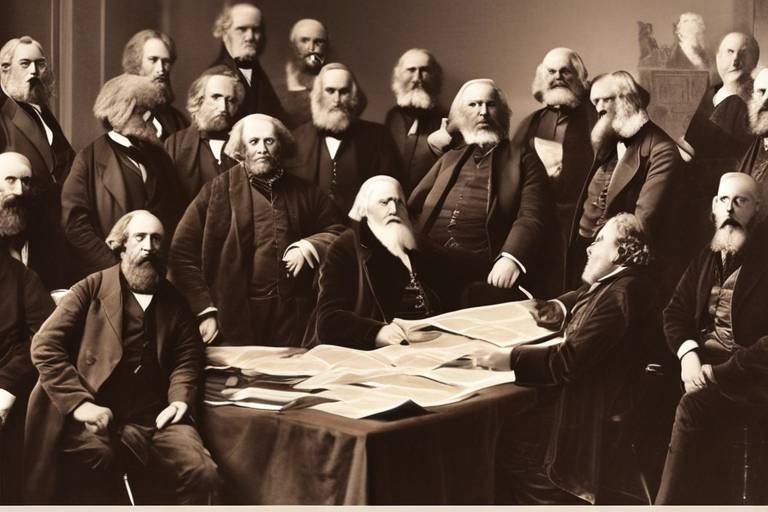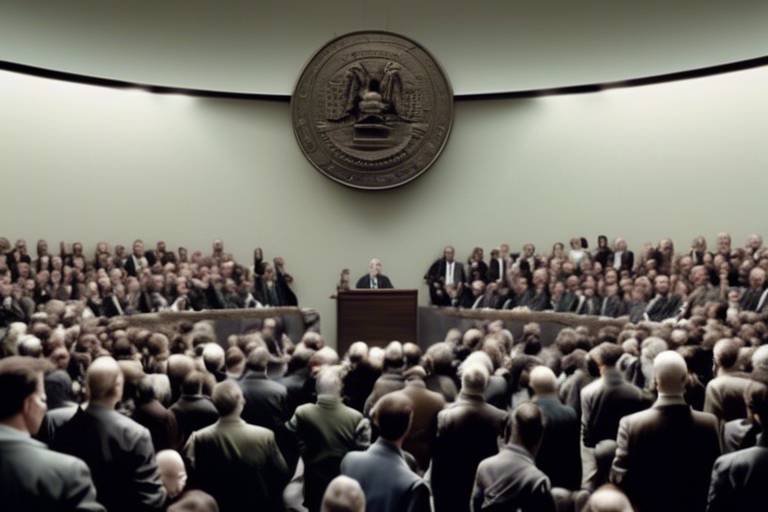The Philosophy and Politics of Surveillance
In today's fast-paced world, the concept of surveillance has evolved into a complex web of ethics, technology, and governance. The intersection of these elements raises profound questions about our freedoms and the lengths to which governments and corporations will go to maintain order and security. As we navigate through the intricacies of surveillance, it becomes crucial to understand not only the practical implications but also the philosophical underpinnings that guide these practices. How do we define the balance between necessary oversight and invasive monitoring? Is it possible to achieve a society that values both security and privacy? In this article, we will explore these questions and more, diving deep into the ethical implications, historical context, and the political landscape surrounding surveillance.
Surveillance is not merely a technical practice; it poses significant ethical dilemmas that challenge our notions of privacy, consent, and autonomy. As we become more interconnected through technology, the lines between public and private life blur, leading to uncomfortable questions about who watches the watchers. Governments and corporations wield immense power through their surveillance capabilities, raising the stakes for individual freedoms. When is it acceptable for a government to monitor its citizens? Are we willing to sacrifice our privacy for the promise of safety? These questions compel us to examine the moral responsibilities that come with surveillance practices.
To truly grasp the implications of surveillance today, we must look back at its historical evolution. From the early days of government monitoring to the revolutionary technological advancements that shape modern practices, the journey of surveillance is fascinating. Key milestones include:
- The establishment of secret police forces in the 19th century
- The advent of wiretapping and phone surveillance in the 20th century
- The rise of digital surveillance with the internet and social media
Understanding these historical contexts provides valuable insight into current trends and societal attitudes towards surveillance. As we reflect on the past, we can better navigate the future.
Technological advancements have revolutionized surveillance capabilities, making it more pervasive and sophisticated than ever before. Innovations like artificial intelligence, facial recognition, and data analytics have transformed the landscape of monitoring and control. For instance, AI algorithms can analyze vast amounts of data in real-time, enabling authorities to identify patterns and predict behaviors. While these technologies can enhance security, they also raise ethical concerns about their potential misuse. The question remains: how do we ensure that technology serves the public good without infringing on individual rights?
Social media platforms have become significant players in the realm of surveillance. Through user data collection, these platforms analyze our behaviors, preferences, and interactions, often without explicit consent. This data is then utilized for various purposes, including targeted advertising and even influencing political opinions. The implications are staggering, as we find ourselves navigating a world where our online presence can be monitored and manipulated. Are we aware of the extent to which our digital footprints are tracked? Understanding this dynamic is crucial for safeguarding our privacy in an increasingly interconnected world.
Mass surveillance has emerged as a prevalent practice in many societies, often justified by the need for national security. However, this widespread monitoring poses significant risks to civil liberties. The potential for abuse by authorities is a pressing concern, as unchecked surveillance can lead to a culture of fear and repression. We must ask ourselves: at what cost do we prioritize safety? The balance between security and personal freedom is delicate, and navigating this terrain requires careful consideration of the ethical implications involved.
Philosophical discourse surrounding surveillance encompasses debates on power, freedom, and ethics. Various philosophical viewpoints shape our understanding of surveillance in society, challenging us to rethink our relationship with authority and technology. For instance, the writings of Michel Foucault on power dynamics prompt us to consider how surveillance influences behavior and societal norms. Are we becoming subjects of surveillance, or can we reclaim our autonomy in a world increasingly defined by monitoring?
Legislation surrounding surveillance is a critical aspect of governance that directly impacts civil rights and liberties. Key laws and policies regulate surveillance practices, but they often lag behind technological advancements. This disconnect can lead to significant gaps in protections for individuals, leaving them vulnerable to invasive monitoring. It is essential for citizens to stay informed about these laws and advocate for reforms that prioritize transparency and accountability in surveillance practices.
Striking a balance between national security and individual privacy is an ongoing debate that stirs passionate opinions on both sides. Proponents of surveillance argue that it is necessary for protecting citizens from threats, while opponents warn of the dangers of infringing on personal freedoms. The challenge lies in finding a middle ground that respects individual rights while ensuring public safety. Can we achieve this balance without compromising our values?
Surveillance practices vary widely across the globe, influenced by cultural, political, and legal factors. Some countries prioritize individual privacy, while others embrace extensive monitoring in the name of security. This disparity raises important questions about global human rights standards and the implications for international relations. As we compare different approaches to surveillance, we must consider the impact on civil liberties and the potential for cooperation in safeguarding human rights.
- What is the primary purpose of surveillance? Surveillance is primarily aimed at ensuring security and monitoring potential threats, but it also raises ethical concerns regarding privacy.
- How does technology impact surveillance practices? Technological advancements, such as AI and data analytics, enhance surveillance capabilities, allowing for more efficient monitoring but also increasing the risk of misuse.
- What are the ethical implications of mass surveillance? Mass surveillance poses significant risks to civil liberties and can lead to abuse of power, creating a culture of fear and repression.
- How can individuals protect their privacy? Individuals can protect their privacy by being aware of their digital footprints, using privacy-enhancing tools, and advocating for stronger data protection laws.

The Ethical Implications of Surveillance
Surveillance is a double-edged sword that cuts through the fabric of our society, raising profound ethical questions about privacy, consent, and autonomy. As we navigate the complexities of modern governance, it's essential to examine the moral responsibilities that both governments and corporations hold in their surveillance practices. After all, when does the need for security cross the line into an invasion of personal freedoms? It's a question that sparks heated debates and philosophical inquiries.
At the heart of these discussions lies the concept of informed consent. Individuals often remain unaware that their data is being collected and analyzed. This lack of transparency raises ethical concerns about whether people are genuinely consenting to surveillance or if they are simply unaware of its extent. Imagine walking through a park, feeling free and unobserved, only to discover that every move you made was being tracked by hidden cameras. It's unsettling, isn't it?
Furthermore, we must consider the implications of power dynamics in surveillance. When a government or corporation possesses the ability to monitor its citizens, it creates an uneven playing field. Those in power may exploit this information for control, manipulation, or even repression. This raises critical questions about the balance of power in society: Are we sacrificing our freedoms for the illusion of safety? The historical context of surveillance reveals a troubling pattern where the justification for monitoring often leads to abuses of power.
The ethical implications of surveillance extend beyond individual rights to encompass broader societal impacts. For instance, the normalization of surveillance can lead to a culture of self-censorship. When individuals know they are being watched, they may alter their behavior, stifling free expression and creativity. This phenomenon can create a chilling effect on democratic discourse, where people hesitate to voice dissenting opinions for fear of retribution. The irony is palpable: in the name of security, we may be undermining the very freedoms we aim to protect.
To illustrate the ethical landscape of surveillance, consider the following table that highlights key ethical concerns:
| Ethical Concern | Description |
|---|---|
| Privacy | The right of individuals to control their personal information and maintain their autonomy. |
| Consent | The need for individuals to be fully informed about what data is collected and how it is used. |
| Power Dynamics | The potential for abuse of power by those who control surveillance technologies. |
| Self-Censorship | The impact of surveillance on free expression and democratic discourse. |
As we ponder these ethical implications, it becomes clear that a delicate balance must be struck. Surveillance should not be a tool for oppression but rather a means of enhancing security while respecting individual rights. This balance is not merely a legal issue but a moral one, demanding introspection from both policymakers and society at large.
In conclusion, the ethical implications of surveillance are vast and intricate, requiring us to engage in ongoing dialogue about the responsibilities of those who wield the power to observe. Are we prepared to advocate for our rights and challenge the status quo? The answer to this question will shape the future of surveillance and its role in our lives.
- What are the main ethical concerns regarding surveillance? The primary concerns include privacy, consent, power dynamics, and self-censorship.
- How does surveillance impact individual freedoms? Surveillance can lead to self-censorship and a chilling effect on free expression, undermining democratic discourse.
- What responsibilities do governments have in surveillance practices? Governments must ensure transparency, obtain informed consent, and prevent the abuse of power in their surveillance activities.

The Historical Context of Surveillance
To truly grasp the intricacies of surveillance in our modern world, we must first take a step back and examine its historical evolution. Surveillance isn't a new phenomenon; it has roots that stretch deep into human history. From the early days of civilization, where rulers would employ spies to monitor their subjects, to the sophisticated technologies we see today, the methods and motivations behind surveillance have transformed dramatically.
In ancient societies, such as those in Egypt and Rome, surveillance was primarily used as a tool for maintaining control and order. Rulers relied on informants and spies to gather intelligence about potential threats, ensuring their reign remained unchallenged. This practice set the stage for what would become a pervasive element in governance throughout history.
Fast forward to the Middle Ages, and we see the emergence of more structured forms of surveillance. With the rise of monarchies, the need for state security became paramount. The establishment of watchmen and town criers served not only to disseminate information but also to keep a vigilant eye on the populace. The concept of surveillance began to intertwine with the idea of public safety, a theme that persists to this day.
As we entered the 20th century, the landscape of surveillance shifted once again, primarily due to technological advancements. The introduction of the telegraph and later the telephone provided new avenues for monitoring communication. Governments began to recognize the potential of these technologies for both national security and social control. The world wars saw the rise of mass surveillance techniques, as nations sought to intercept communications and gather intelligence on enemy movements.
With the advent of the digital age in the late 20th century, surveillance took another leap forward. The internet revolutionized not only how we communicate but also how we are monitored. Governments and corporations began to collect vast amounts of data on individuals, leading to an era where our online activities are constantly tracked. This shift raised significant ethical questions about privacy and consent, as people became increasingly aware of their digital footprints.
To illustrate the evolution of surveillance practices, consider the following table that highlights key milestones:
| Time Period | Surveillance Method | Purpose |
|---|---|---|
| Ancient Civilizations | Spies and Informants | Maintain Control |
| Middle Ages | Watchmen and Town Criers | Public Safety |
| 20th Century | Telegraph and Telephone Monitoring | National Security |
| Digital Age | Data Collection and Internet Monitoring | Social Control |
As we reflect on this historical context, it's clear that surveillance has evolved from a rudimentary means of control to a complex web of technologies and practices that intertwine with daily life. The implications of this evolution are profound, affecting how we perceive freedom and privacy in our contemporary society. Understanding this history is crucial as we navigate the ongoing debates surrounding surveillance, as it provides the backdrop against which current practices are scrutinized.
In conclusion, the historical context of surveillance reveals a persistent tension between the need for security and the desire for privacy. As we continue to advance technologically, the lessons of the past serve as a reminder of the ethical responsibilities that come with the power to monitor and control.
- What is the primary purpose of surveillance? Surveillance is primarily used for maintaining security, gathering intelligence, and monitoring populations.
- How has technology changed surveillance practices? Technological advancements have introduced sophisticated methods such as AI, facial recognition, and data analytics, enhancing the capabilities of surveillance.
- What ethical concerns arise from surveillance? Key ethical concerns include issues of privacy, consent, and the potential for abuse of power by authorities.

The Role of Technology in Surveillance
In today's world, technology plays a pivotal role in shaping the landscape of surveillance. From the moment we wake up to the sound of our smartphones buzzing with notifications, we are surrounded by an intricate web of surveillance systems designed to monitor, analyze, and sometimes manipulate our behaviors. But what does this mean for our privacy and autonomy? The advancements in technology have not only enhanced surveillance capabilities but have also raised profound ethical questions that society must grapple with.
One of the most significant technological advancements in surveillance is the use of Artificial Intelligence (AI). AI algorithms can process vast amounts of data at lightning speed, identifying patterns that would be nearly impossible for humans to discern. For instance, law enforcement agencies now employ AI-driven facial recognition systems to identify individuals in crowded places. While this can enhance public safety, it also poses risks of misidentification and potential misuse, leading to a chilling effect on freedom of expression.
Moreover, the rise of data analytics has transformed how organizations collect and utilize information. Companies and governments can now track online behaviors, purchasing habits, and even social interactions. This data is often aggregated and analyzed to create detailed profiles of individuals, which can be used for targeted advertising or, more concerningly, for surveillance purposes. The ethical implications of such practices are staggering: are individuals giving consent when they click 'agree' on lengthy terms and conditions, or are they unwittingly surrendering their privacy?
Another key player in the surveillance game is Internet of Things (IoT) devices. From smart home assistants to connected cars, these technologies continuously gather data about our daily lives. While they offer convenience, they also create a vast network of surveillance that can be exploited. For example, smart speakers can record conversations, and this data can be accessed by companies or even government entities. The question arises: how much of our personal life are we willing to sacrifice for the sake of convenience?
To illustrate the impact of technology on surveillance, consider the following table that highlights some of the major technological tools used in modern surveillance:
| Technology | Description | Implications |
|---|---|---|
| Facial Recognition | AI systems that identify individuals based on facial features. | Potential for misuse and privacy violations. |
| Data Analytics | Processing large datasets to identify patterns and behaviors. | Concerns over consent and data ownership. |
| IoT Devices | Connected devices that collect data from users. | Increased surveillance and data vulnerability. |
As we delve deeper into the implications of these technologies, it's essential to recognize that the role of technology in surveillance is not merely a question of capability but also one of ethics and governance. The balance between leveraging technology for public safety and protecting individual rights is a delicate one. Policymakers must navigate this complex terrain, ensuring that advancements do not come at the cost of fundamental freedoms.
In conclusion, the role of technology in surveillance is multifaceted and continuously evolving. While it offers the promise of enhanced security and efficiency, it also necessitates a critical examination of the ethical and societal implications. As we move forward, we must advocate for transparency and accountability in how these technologies are deployed, ensuring that the rights of individuals are not overshadowed by the pursuit of security.
- What is the primary concern regarding surveillance technology? The main concerns include privacy violations, misuse of data, and the potential for abuse by authorities.
- How does AI impact surveillance practices? AI enhances the ability to process and analyze large datasets, allowing for more efficient monitoring but raising ethical questions about consent and accuracy.
- Are IoT devices safe to use? While they offer convenience, IoT devices can pose risks to privacy and data security, as they continuously collect user information.
- What can individuals do to protect their privacy? Individuals can take steps such as using privacy settings, being cautious with sharing personal information, and utilizing encryption tools.

The Impact of Social Media Surveillance
The rise of social media has fundamentally reshaped how we communicate, connect, and share information. However, this digital revolution comes with a significant caveat: the pervasive nature of surveillance that accompanies our online interactions. Social media platforms, while providing a space for expression and connectivity, also serve as potent tools for monitoring user behavior. Have you ever wondered who is watching your every click, like, and share? The truth is, the data we generate online is often harvested, analyzed, and utilized in ways that many of us may not fully grasp.
At the heart of social media surveillance lies the collection of user data, which can be categorized into several types:
- Personal Information: This includes details like your name, age, location, and interests, which platforms collect during account creation.
- Behavioral Data: Every interaction, from likes to shares, contributes to a digital footprint that companies analyze to tailor advertisements and content.
- Geolocation Data: Many apps track your location, providing insights into your daily movements and habits.
These data points are not just numbers; they represent our lives, preferences, and even our beliefs. The implications of this surveillance are profound. For one, the privacy of individuals is often compromised, leading to a sense of vulnerability. Users may feel like they are under a microscope, which can stifle genuine expression and lead to self-censorship. Think about it: if you know that your every post is being analyzed, would you still share your true thoughts and feelings?
Moreover, the use of this data extends beyond targeted advertising. It can influence political campaigns, shape public opinion, and even affect social movements. For instance, during significant events like elections or protests, social media platforms have been used to monitor and sometimes suppress dissent. This raises critical ethical questions: how much power should these companies have over our voices? And what happens when they decide to manipulate the information we see?
To illustrate the extent of social media surveillance, consider the following table that outlines some key statistics:
| Statistic | Percentage |
|---|---|
| Users who are aware of data collection | 60% |
| Users who feel their privacy is compromised | 75% |
| Users who have adjusted their privacy settings | 45% |
As we navigate this complex landscape, it becomes increasingly essential for users to understand their rights and the implications of their digital footprints. Engaging with social media comes with a responsibility to be aware of how our data is used. Are we willing to sacrifice our privacy for the sake of connectivity? This is a question we must all ponder as we scroll through our feeds.
In conclusion, social media surveillance is a double-edged sword. While it facilitates connection and communication, it also poses significant risks to our privacy and autonomy. As users, we must remain vigilant and informed, advocating for greater transparency and ethical practices from the platforms we choose to engage with.
- What is social media surveillance? - It refers to the monitoring and analysis of user data by social media platforms to understand behavior and preferences.
- How does social media surveillance affect privacy? - It can lead to a significant compromise of personal privacy, as user data is often collected without explicit consent.
- Can I protect my data on social media? - Yes, users can adjust privacy settings, limit data sharing, and be mindful of the information they share online.

The Rise of Mass Surveillance
In recent years, the phenomenon of mass surveillance has surged to the forefront of societal concerns, intertwining with our daily lives in ways we often overlook. Imagine walking down the street, and every move you make is captured, analyzed, and stored by unseen eyes. This isn't a scene from a dystopian movie; it's the reality of our modern world. The expansion of surveillance technologies has enabled governments and corporations to monitor vast populations, raising profound questions about civil liberties and individual rights.
Mass surveillance can be defined as the extensive monitoring of a large number of individuals, often without their knowledge or consent. This practice has become increasingly prevalent due to advancements in technology, particularly in the realms of data collection and analysis. Governments justify these measures in the name of national security, claiming that such surveillance is essential to prevent terrorism and crime. However, the implications of these actions extend far beyond mere safety.
One of the most alarming aspects of mass surveillance is its potential for abuse. When authorities have access to comprehensive data about individuals, the risk of overreach and misuse becomes alarmingly high. For example, consider the following scenarios:
- Targeting dissent: Governments may use surveillance data to identify and suppress political opposition.
- Discrimination: Surveillance practices can disproportionately affect marginalized communities, leading to systemic bias.
- Chilling effect: The knowledge that one is being watched can deter individuals from exercising their freedoms, such as free speech and assembly.
Additionally, the rise of social media has exacerbated the issue. Platforms like Facebook and Twitter collect vast amounts of user data, which can be analyzed and sold to third parties, including government agencies. This creates a complex web of surveillance where individuals unknowingly become part of a larger monitoring system. The data harvested from social media can reveal not only personal preferences but also political affiliations, making it a powerful tool for those in power.
As we navigate this landscape, it’s crucial to engage in conversations about the ethical implications of mass surveillance. Are we willing to trade our privacy for a perceived sense of security? This question lies at the heart of the debate surrounding mass surveillance. While some argue that it is a necessary evil in today’s world, others contend that the erosion of privacy is too high a price to pay.
In conclusion, the rise of mass surveillance is a complex issue that requires careful consideration and dialogue. As technology continues to evolve, so too must our understanding of its implications on society. We must remain vigilant, advocating for transparency and accountability in surveillance practices to ensure that our fundamental rights are not compromised in the name of security.
- What is mass surveillance? Mass surveillance refers to the extensive monitoring of individuals, often without their consent, typically conducted by governments or corporations.
- How does technology facilitate mass surveillance? Technological advancements such as AI, facial recognition, and data analytics enhance the capabilities of surveillance, allowing for the monitoring of large populations.
- What are the risks associated with mass surveillance? Risks include potential abuse of power, discrimination against marginalized groups, and a chilling effect on free speech and assembly.
- How can individuals protect their privacy? Individuals can protect their privacy by using encryption tools, being mindful of the information they share online, and advocating for stronger privacy laws.

The Philosophical Perspectives on Surveillance
When we dive into the philosophical perspectives on surveillance, we find ourselves navigating a complex web of power dynamics, freedom, and ethical considerations. At the heart of this discourse lies a fundamental question: What does it mean to be watched? This question challenges our understanding of autonomy and privacy, urging us to reflect on our societal values and the implications of being constantly monitored.
Philosophers have long debated the nature of surveillance, often contrasting the benefits of security with the potential for oppression. One key perspective comes from the social contract theory, which posits that individuals consent, either explicitly or implicitly, to give up some degree of freedom in exchange for protection and order. However, this trade-off becomes problematic when the means of surveillance are disproportionate or when the authorities misuse their power. John Locke and Jean-Jacques Rousseau would argue that a legitimate government must maintain a balance between security and the rights of individuals, emphasizing that surveillance should not infringe upon personal liberties beyond what is necessary for the common good.
Moreover, the Panopticon, a concept introduced by philosopher Jeremy Bentham, serves as a powerful metaphor for modern surveillance. The Panopticon is a circular prison design where inmates are always visible to a central watchtower, creating a sense of constant observation. This idea raises profound questions about the effects of surveillance on behavior and self-regulation. When individuals know they are being watched, they may alter their actions, leading to a form of self-censorship that can stifle creativity and individuality. Thus, the Panopticon symbolizes not just a physical structure but a pervasive societal condition where the fear of being surveilled can shape our very identities.
In addition, the philosophical discourse around surveillance also intersects with Foucault’s theories on power and discipline. Foucault argued that modern societies employ surveillance as a means of social control, normalizing certain behaviors while marginalizing others. This perspective invites us to consider how surveillance can perpetuate systemic inequalities, as marginalized communities often bear the brunt of invasive monitoring practices. The implications are profound: surveillance can become a tool of oppression, reinforcing existing power structures while silencing dissenting voices.
As we explore these philosophical perspectives, it’s essential to recognize the role of technology in shaping our understanding of surveillance. The rapid advancements in data collection and monitoring technologies have transformed the landscape, complicating the ethical and philosophical debates. For instance, the rise of artificial intelligence and big data analytics has enabled unprecedented levels of surveillance, raising questions about consent and autonomy. Are we truly consenting to be surveilled when the terms of service are often buried in lengthy legal documents? This challenge calls for a critical examination of how we define consent in the digital age.
In conclusion, the philosophical perspectives on surveillance are not merely academic; they resonate deeply with our lived experiences in an increasingly monitored world. As we grapple with the implications of surveillance, we must ask ourselves how we can uphold our values of freedom and privacy in the face of growing technological capabilities. The dialogue surrounding surveillance is ongoing, and it is crucial for us as individuals and as a society to engage in these discussions actively. After all, the question remains: How much of our freedom are we willing to sacrifice for the illusion of security?
- What are the main ethical concerns regarding surveillance?
The primary ethical concerns include privacy violations, lack of consent, and the potential for abuse of power by authorities. - How has technology changed surveillance practices?
Technology, especially AI and data analytics, has enabled more sophisticated and widespread surveillance methods, often without individuals' knowledge. - What is the Panopticon, and why is it significant?
The Panopticon is a philosophical concept representing constant surveillance and its effects on behavior, highlighting the power dynamics in society. - How do different countries approach surveillance?
Surveillance practices vary widely across countries, influenced by cultural, political, and legal factors, impacting civil rights differently.

The Politics of Surveillance Legislation
Surveillance legislation is a complex and often contentious area of politics that touches on fundamental issues of civil rights and government authority. In an age where technology enables unprecedented levels of monitoring, the laws governing these practices must adapt to ensure a balance between the need for security and the protection of individual freedoms. The debate surrounding surveillance legislation often raises questions about who holds the power to watch and why, leading to a broader discussion about transparency and accountability in governance.
One of the critical aspects of surveillance legislation is the framework it provides for the collection and use of data. Governments around the world have enacted various laws aimed at regulating surveillance practices, each shaped by its unique political landscape. For instance, in the United States, the Patriot Act was introduced in the wake of the September 11 attacks, significantly expanding the government's surveillance capabilities under the guise of national security. This act sparked a fierce debate about the extent to which the government should be allowed to infringe on personal privacy in the name of safety.
In contrast, many European nations have adopted stricter privacy laws, such as the General Data Protection Regulation (GDPR), which emphasizes the protection of personal data and gives individuals more control over their information. This divergence in approaches highlights the political and cultural differences that influence surveillance legislation globally. While some countries prioritize security, others focus on safeguarding individual rights, leading to a patchwork of laws that can be confusing and inconsistent.
Moreover, the role of corporations in surveillance cannot be overlooked. Tech giants like Google and Facebook have become significant players in the surveillance game, collecting vast amounts of data from users. This data is often shared with governments, raising ethical questions about consent and the commodification of personal information. As these corporations wield immense power, the legislation governing their surveillance practices has become increasingly critical.
To illustrate the varied approaches to surveillance legislation, consider the following table:
| Country | Key Legislation | Focus |
|---|---|---|
| United States | Patriot Act | National Security |
| United Kingdom | Investigatory Powers Act | Law Enforcement |
| Germany | Federal Data Protection Act | Privacy Rights |
| European Union | General Data Protection Regulation (GDPR) | Data Protection |
The ongoing debate about surveillance legislation also includes discussions about the balance between security and privacy. Advocates for increased surveillance often argue that in a world fraught with threats, the government has a duty to protect its citizens, even if it means compromising some personal freedoms. On the other hand, privacy advocates warn that unchecked surveillance can lead to a slippery slope where individual rights are continuously eroded. This tension creates a dynamic political landscape where legislation is constantly being challenged and revised.
In conclusion, the politics of surveillance legislation is a vital aspect of contemporary governance that reflects broader societal values regarding freedom and security. As technology continues to evolve, so too will the laws that govern surveillance, necessitating ongoing public discourse and legislative scrutiny to ensure that the rights of individuals are upheld while maintaining the safety of society as a whole.
- What is surveillance legislation?
Surveillance legislation refers to the laws and regulations that govern how and when governments and corporations can monitor individuals and collect data. - Why is surveillance legislation important?
It is crucial for protecting individual rights and ensuring that surveillance practices do not infringe on personal freedoms while addressing national security concerns. - How do different countries approach surveillance?
Countries vary widely in their surveillance practices, influenced by cultural, political, and legal factors, resulting in a range of laws from strict privacy protections to expansive surveillance powers.

In today’s world, the tug-of-war between security and privacy has become more pronounced than ever. On one side, we have governments and institutions advocating for increased surveillance measures to protect citizens from threats, while on the other, individuals are raising their voices against the potential erosion of their personal freedoms. But how do we find a middle ground? Is it possible to ensure safety without sacrificing our fundamental rights?
To put it simply, the balance between security and privacy is like walking a tightrope. On one hand, security is essential for maintaining order and protecting against threats, both domestic and foreign. After all, who wouldn’t want to feel safe in their own home or while going about their daily lives? However, when the scales tip too far in favor of security, we risk creating a society where individuals are constantly monitored, leading to a culture of fear and compliance.
Consider this: how much of your personal information are you willing to give up for the sake of safety? In many cases, individuals may not even realize the extent of the data being collected about them. From browsing habits to social media interactions, every click can be tracked. This raises an important question: at what point does the quest for security infringe upon our right to privacy?
One way to visualize this balance is through a simple table that outlines the potential benefits and drawbacks of increased surveillance:
| Benefits of Surveillance | Drawbacks of Surveillance |
|---|---|
| Enhanced national security | Invasion of personal privacy |
| Prevention of crime | Chilling effect on free speech |
| Improved public safety measures | Potential for abuse of power |
| Informed decision-making by authorities | Loss of trust in government |
As we can see, while there are undeniable advantages to surveillance, the potential consequences cannot be ignored. Furthermore, the debate often centers around the justification of surveillance practices. Are we truly safer because of these measures, or are we merely trading our freedoms for a false sense of security? This dilemma is compounded by the fact that the technology used for surveillance continues to evolve at a breakneck pace. Innovations such as artificial intelligence and facial recognition have made it easier than ever for authorities to monitor individuals, but they also raise serious ethical concerns.
Moreover, public sentiment plays a crucial role in this discussion. In times of crisis, people may be more willing to accept invasive measures in exchange for safety. However, as the dust settles, the question remains: will they continue to support such measures when the immediate threat has passed? It’s a cyclical pattern that highlights the need for ongoing dialogue about the implications of surveillance.
Ultimately, finding the right balance between security and privacy requires a nuanced approach. Policymakers must engage with the public, consider ethical implications, and create regulations that protect individual rights while addressing legitimate security concerns. It’s not just about choosing one over the other; it’s about crafting a framework that respects both.
- What is the main concern regarding surveillance? The primary concern is the potential infringement on individual privacy and civil liberties, especially when surveillance is conducted without consent or oversight.
- How can we ensure our privacy while maintaining security? Striking a balance involves transparent policies, public engagement, and oversight mechanisms that protect individual rights while addressing security needs.
- Are there any laws regulating surveillance? Yes, various laws exist to regulate surveillance practices, but these vary significantly by country and often require updates to keep pace with technological advancements.
- What role does technology play in the surveillance debate? Technology enhances surveillance capabilities but also raises ethical concerns regarding data collection, consent, and potential misuse of information.

The Global Landscape of Surveillance Practices
When we look at the global landscape of surveillance practices, it’s like peering through a kaleidoscope of laws, technologies, and cultural attitudes. Each country has its own unique approach, influenced by factors such as political climate, historical context, and public sentiment. For instance, in countries like the United States, surveillance is often justified under the guise of national security, especially post-9/11. This has led to the implementation of extensive programs that monitor citizens’ online activities, phone calls, and even location data.
On the other hand, nations such as China have taken surveillance to an entirely different level. The government's use of technology to monitor its citizens is pervasive, with reports indicating that over a billion cameras are installed across the country. These cameras are equipped with facial recognition technology, enabling authorities to track individuals in real-time. This raises profound questions about personal freedoms and the extent to which a state can intrude into the lives of its citizens.
In Europe, the General Data Protection Regulation (GDPR) has emerged as a robust framework aimed at protecting personal data. It reflects a growing awareness and concern about privacy rights among citizens. The GDPR mandates that organizations obtain explicit consent before collecting personal data, offering individuals greater control over their information. However, even within Europe, the implementation of surveillance varies significantly. For example, countries like Germany have strict laws governing surveillance practices, rooted in a historical context that is sensitive to the abuses of power seen during the Nazi regime.
To illustrate these differences, consider the following table that summarizes the surveillance practices in various regions:
| Region | Key Surveillance Practices | Privacy Protections |
|---|---|---|
| United States | Mass data collection, NSA monitoring | Limited; some state laws |
| China | Extensive camera networks, social credit system | Minimal |
| Europe | Data retention laws, GDPR | Strong protections under GDPR |
| Russia | Internet monitoring, data localization laws | Weak protections |
Moreover, in regions like Russia, the government has implemented stringent laws that require internet service providers to store user data locally, allowing for easier access by authorities. This has prompted concerns over the erosion of privacy and the potential for abuse of power. The global disparity in surveillance practices highlights a fundamental question: how do we balance the need for security with the right to privacy?
As we navigate this complex landscape, it’s crucial to recognize that surveillance is not merely a technological issue; it is deeply intertwined with human rights and ethical considerations. The challenge lies in fostering a dialogue that respects individual freedoms while addressing legitimate security concerns. Each country’s approach to surveillance serves as a reflection of its values, priorities, and the delicate balance between authority and autonomy.
- What is surveillance? Surveillance refers to the monitoring of behavior, activities, or information for the purpose of influencing, managing, directing, or protecting people.
- How does surveillance impact privacy? Surveillance can infringe on personal privacy by collecting data without consent, leading to potential misuse of information.
- Are there laws regulating surveillance? Yes, various countries have laws that regulate surveillance practices, but these laws differ significantly in their scope and enforcement.
- What can individuals do to protect their privacy? Individuals can use encryption tools, be cautious about sharing personal information online, and advocate for stronger privacy protections in their respective countries.
Frequently Asked Questions
- What are the ethical implications of surveillance?
Surveillance raises significant ethical questions about privacy, consent, and autonomy. It challenges the moral responsibilities of both governments and corporations, as their practices can infringe on individual freedoms. The balance between ensuring security and respecting personal privacy is a central concern in this debate.
- How has surveillance evolved over time?
Understanding the historical context of surveillance reveals how practices have changed dramatically. From early government monitoring to the advanced technologies we see today, each milestone has contributed to the current landscape of surveillance. This evolution has been shaped by technological advancements and societal changes.
- What role does technology play in modern surveillance?
Technological advancements, such as artificial intelligence, facial recognition, and data analytics, have revolutionized surveillance capabilities. These innovations allow for more sophisticated monitoring and control, raising important questions about privacy and the ethical use of such technologies.
- How does social media contribute to surveillance?
Social media platforms are major players in the surveillance landscape, as they collect and analyze vast amounts of user data. This data is utilized for various purposes, including targeted advertising and law enforcement, which raises critical concerns about user consent and privacy.
- What are the implications of mass surveillance?
Mass surveillance has become increasingly prevalent, leading to significant implications for civil liberties. The potential for abuse by authorities is a major concern, as widespread monitoring can infringe on individual rights and freedoms, creating a society where privacy is severely compromised.
- What philosophical perspectives exist on surveillance?
Philosophical discussions around surveillance often focus on power dynamics, freedom, and ethical considerations. Various viewpoints help us understand the implications of surveillance in society and challenge us to think critically about its role in our lives.
- How is surveillance regulated by legislation?
Legislation plays a critical role in governing surveillance practices. Laws and policies are designed to protect civil rights and liberties while ensuring national security. Understanding these regulations is essential to grasping the balance between safety and privacy.
- What is the balance between security and privacy?
The ongoing debate over the balance between national security and individual privacy is contentious. Advocates for security argue that surveillance is necessary to prevent threats, while privacy advocates emphasize the importance of protecting personal freedoms from government overreach.
- How do surveillance practices differ globally?
Surveillance practices vary significantly across countries, influenced by cultural, political, and legal factors. This diversity can impact global human rights standards, as different nations adopt varying approaches to monitoring their citizens.



















